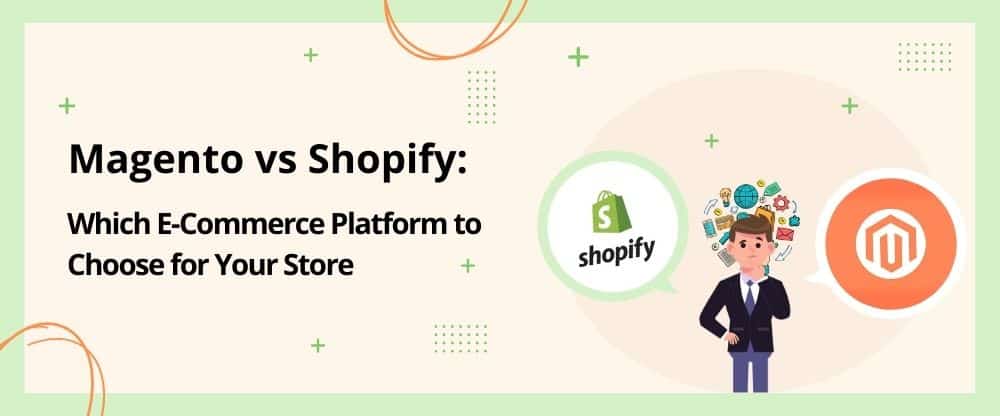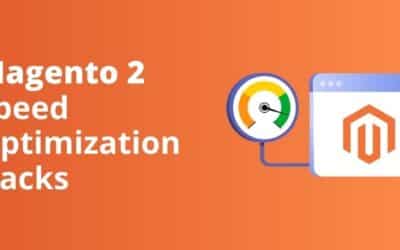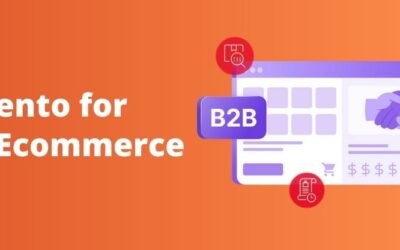Summary of the Article
Have a project in mind?
Schedule a CallMagento vs Shopify: Which E-Commerce Platform to Choose for Your Store
Summary of the Article
Choosing the right platform for your online store can make or break your e-commerce success. In the battle of Magento vs Shopify, both platforms shine in their own ways, but which one is the perfect match for your business? Whether you need the full flexibility of Magento’s open-source power or the simplicity and all-in-one solution of Shopify, this guide will help you decide. Let’s dive in and settle the Magento vs Shopify debate once and for all!
Overview of Magento and Shopify: Powering the Future of E-Commerce
What is Magento?
Magento is an open-source e-commerce platform, launched in 2008 and acquired by Adobe in 2018. Known for its flexibility and powerful customization options, Magento allows businesses to create fully tailored online stores. It’s a popular choice for companies looking for scalability and complete control over their e-commerce operations.
Key Features of Magento:
Unlimited Customization: Design your store exactly how you envision, with full control over every detail.
Seamless Scalability: Grow effortlessly, whether you’re a small startup or a global enterprise.
Built-in SEO Optimization: Drive more traffic with advanced SEO tools right at your fingertips.
Flexible Integrations: Connect easily with third-party tools and services to enhance your store.
Multi-Store Capability: Manage multiple stores from a single Magento installation with ease.
Robust Security Features: Protect your store with built-in security measures and regular updates.
Current Google Trend for Magento
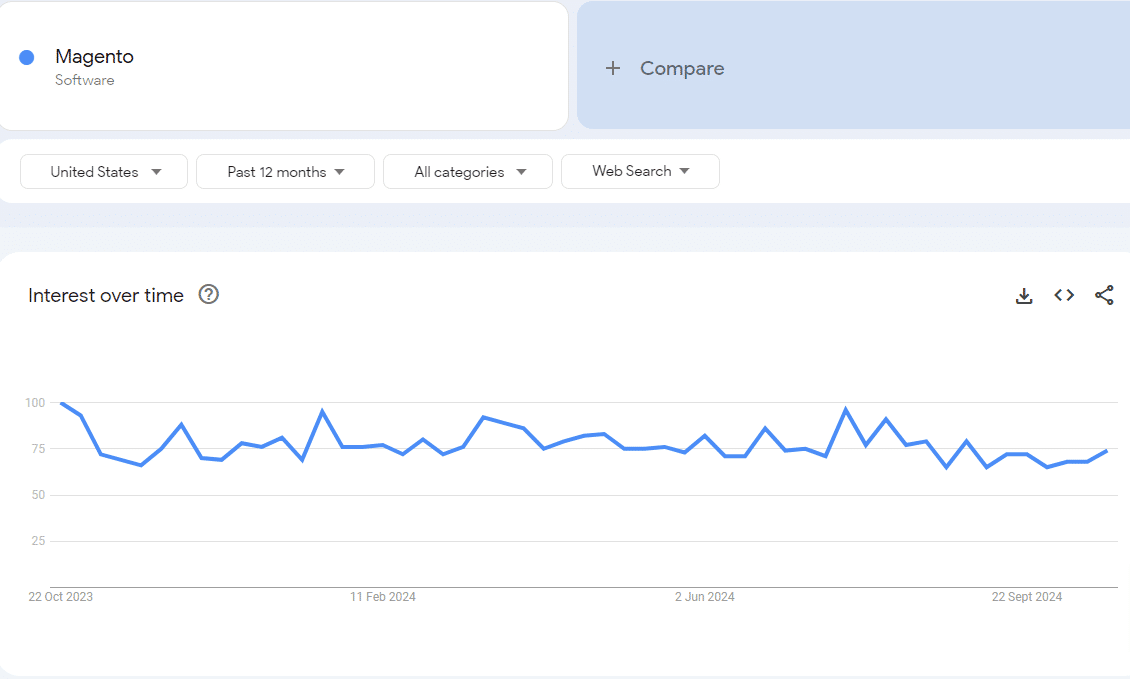
In 2024, Magento continues to be a popular choice, especially in Europe, powering over 120,000 live websites. While Shopify has seen rapid global growth, Magento remains the preferred platform for businesses needing scalability and complex customizations. Magento’s popularity is supported by advanced features like headless commerce and AI-driven personalization. Although Shopify has overtaken Magento in broader usage, Magento is still favored by large enterprises with high-traffic and multi-store needs. By 2025, Magento’s focus on mobile commerce and immersive technologies like AR/VR will help maintain its strong foothold among large-scale businesses, despite Shopify’s continued expansion
Popular Websites Using Magento

Top brands like Nike, Coca-Cola, and Ford rely on Magento to power their online stores. Known for its flexibility and ability to handle high-traffic websites, Magento is a popular choice for enterprises seeking scalable, customized e-commerce solutions. These brands highlight Magento’s strength in supporting complex business needs.
What is Shopify?
Shopify is a leading all-in-one e-commerce platform designed to help individuals and businesses create and manage their online stores. Launched in 2006, Shopify has grown rapidly due to its user-friendly interface and comprehensive set of built-in tools that allow users to set up a store quickly without needing advanced technical skills. Shopify is especially popular with small to medium-sized businesses, offering scalable solutions that grow with their business needs.
Key Features and Offerings:
Ease of Use: No coding required with drag-and-drop design features.
Built-In Hosting: Shopify manages hosting, security, and updates for users.
App Store: Thousands of apps to extend store functionality, from marketing tools to inventory management.
Mobile Optimization: All themes are mobile-friendly, ensuring a seamless shopping experience on any device.
Shopify Payments: Integrated payment solution that removes transaction fees when used.
Multichannel Selling: Integrates with platforms like Facebook, Instagram, and Amazon for expanded sales opportunities.
Current Google Trend for Shopify Development
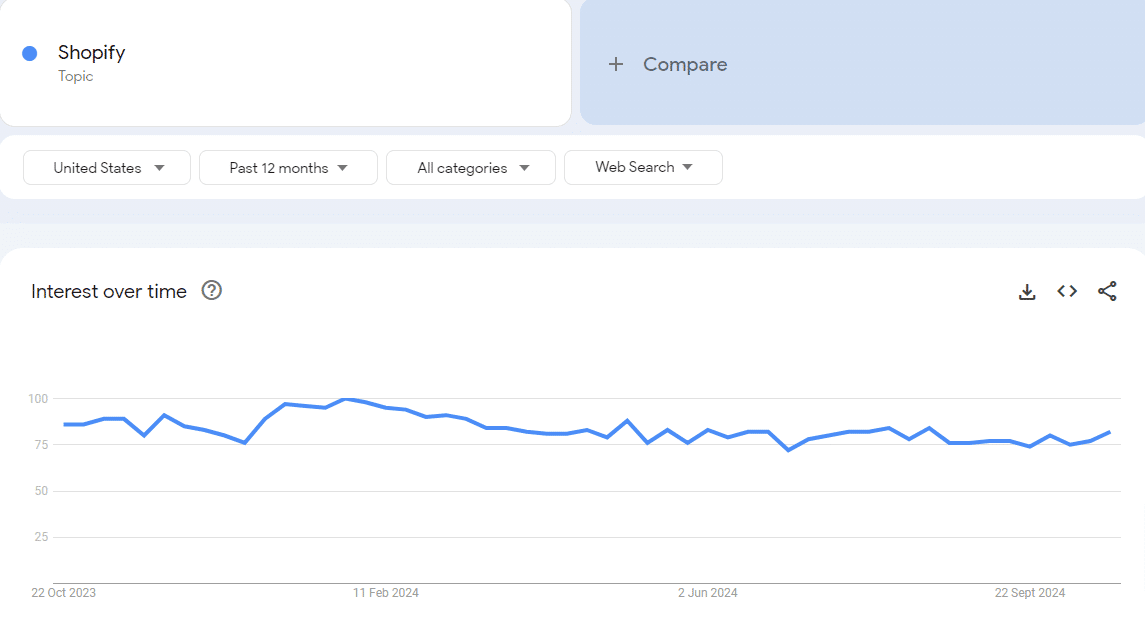
Since 2018, Shopify has seen a rapid rise in popularity, overtaking many competitors like Magento. In recent years, more businesses have opted for Shopify due to its simplicity and fast setup, making it a preferred choice for small to mid-sized businesses. According to Google Trends, Shopify has maintained steady growth, particularly in regions like North America, MENA, and Oceania, while continuing to expand its presence globally. Its ease of use and built-in features have made it a go-to solution for entrepreneurs wanting to get their stores online quickly.
Popular Websites Using Shopify

Shopify powers some of the biggest brands in the world, including Gymshark, Kylie Cosmetics, and Allbirds. These businesses rely on Shopify for its robust e-commerce tools, scalability, and ability to handle large volumes of traffic, while maintaining a smooth user experience. The platform’s versatility and ease of use make it a favorite among both emerging businesses and established brands alike.
Shopify vs Magento A Detailed Side-by-Side Comparison of Key Differences
When choosing the right e-commerce platform, it’s essential to understand how Shopify vs Magento stack up against each other. Below is a detailed comparison of these two platforms, highlighting key differences in functionality, ease of use, scalability, and more.
1. Ease of Use: Which Platform is Simpler?
| Platform | Ease of Use |
|---|---|
| Shopify | Beginner-friendly with a drag-and-drop interface, no coding required. Ideal for users with little to no technical experience. |
| Magento | More complex and requires coding knowledge. Best suited for businesses with dedicated developers or a development team. |
Verdict: Shopify is the clear winner for ease of use, as it’s designed for users who want to set up quickly without technical skills, while Magento offers more control but demands expertise.
2. Customization & Flexibility: How Much Control Do You Need?
| Platform | Customization |
|---|---|
| Shopify | Limited backend access but offers a wide range of themes and apps for customization. |
| Magento | Fully customizable with open-source code access, allowing for complete control over every aspect of your store. |
Verdict: Magento takes the lead for businesses needing deep customization and flexibility, while Shopify offers easier, app-based solutions for customization.
3. Scalability: How Well Do They Grow with Your Business?
| Platform | Scalability |
|---|---|
| Shopify | Great for small to mid-sized businesses. Shopify Plus offers enterprise solutions for large businesses. |
| Magento | Highly scalable, making it a top choice for large enterprises with high-traffic websites and complex needs. |
Verdict: Magento excels in handling large, complex stores, while Shopify is better suited for smaller businesses looking for simpler scalability options.
4. Hosting and Security: Managed or DIY?
| Platform | Hosting & Security |
|---|---|
| Shopify | Fully hosted platform. Shopify manages security, updates, and hosting. |
| Magento | Self-hosted (Magento Open Source) or hosted via third-party providers (Magento Commerce). You manage your security and hosting. |
Verdict: Shopify wins for those who prefer an all-in-one solution with hosting and security handled for you, while Magento provides more control bu
5. SEO & Marketing Tools: Which Platform Supports Better Visibility?
| Platform | SEO & Marketing |
|---|---|
| Shopify | Solid built-in SEO tools with marketing apps available but with limited customization. |
| Magento | Advanced SEO capabilities with full control over optimization, ideal for businesses focused on in-depth marketing strategies. |
Verdict: Magento offers more robust SEO and marketing tools for businesses that need comprehensive control, whereas Shopify provides adequate options for less technical users.
6. Payment Gateways & Transaction Fees: How Do You Get Paid?
| Platform | Payment Options | Transaction Fees |
|---|---|---|
| Shopify | Supports various payment gateways, including Shopify Payments (no additional fees with Shopify Payments). | Transaction fees apply when using third-party gateways. |
| Magento | Flexible integration with any payment provider. No platform transaction fees, but payment gateway fees apply. | No additional transaction fees from Magento. |
Verdict: Magento offers more payment flexibility with no transaction fees, while Shopify is convenient but may charge additional fees when using external gateways.
7. Cost: What is the Price Tag?
| Platform | Cost Structure |
|---|---|
| Shopify | Monthly subscription-based pricing, starting from low-tier plans to Shopify Plus for enterprises. Additional costs for apps, themes, and transaction fees. |
| Magento | Magento Open Source is free but comes with additional costs for hosting, extensions, and development. Magento Commerce (paid version) can be costly but is packed with enterprise features. |
Verdict: Shopify offers predictable pricing, while Magento’s costs can vary significantly based on your needs and hosting choices.
8. Support and Community: Where Can You Get Help?
| Platform | Support |
|---|---|
| Shopify | 24/7 support via chat, phone, and email, with extensive documentation and community forums. |
| Magento | Community support for open-source users. Paid Magento Commerce users receive dedicated support. A large community of developers is also available. |
Verdict: Shopify wins for comprehensive, round-the-clock support, while Magento’s community and developer resources are valuable for businesses with in-house technical expertise.
After reviewing these eight key differences, it’s clear that both Shopify and Magento offer unique advantages depending on your business needs. If you’re a small to medium-sized business looking for an easy-to-use platform with built-in features and reliable customer support, Shopify may be the ideal choice. On the other hand, if you’re running a larger enterprise or need a fully customizable platform to handle complex e-commerce operations, Magento offers unparalleled flexibility and scalability. Choosing between Shopify vs Magentoultimately comes down to your goals, technical expertise, and the level of control you need for your online store.
Shopify vs Magento: The E-Commerce Showdown

Adobe Commerce Magento vs Shopify Who is the Real Winner?
When deciding between Adobe Commerce (Magento) and Shopify, consider your business needs. Shopify is perfect for small to mid-sized businesses that want a quick and easy setup. Its user-friendly interface allows anyone to launch an online store without technical skills, making it a great choice for entrepreneurs focused on sales.
In contrast, Adobe Commerce (Magento) is designed for larger enterprises that require extensive customization and scalability. While it offers powerful features and full control over your online store, it does need more technical expertise. Ultimately, the right platform depends on whether you prefer simplicity and speed or the flexibility to handle complex, high-traffic operations.
Why Choose VT Netzwelt for Your E-Commerce Development Needs?
When it comes to e-commerce development, choosing the right partner is crucial for success. As a leading Shopify Development Company and provider of top-notch Magento Development Services, VT Netzwelt stands out as an award-winning company dedicated to delivering exceptional online shopping experiences. Our team of skilled developers and designers harnesses the power of both platforms to create tailor-made solutions that meet your unique business requirements. With a proven track record of successful projects, we ensure seamless integrations, user-friendly interfaces, and robust security, setting you up for growth and success in the competitive e-commerce landscape. Trust VT Netzwelt to elevate your online presence and drive your business forward!
